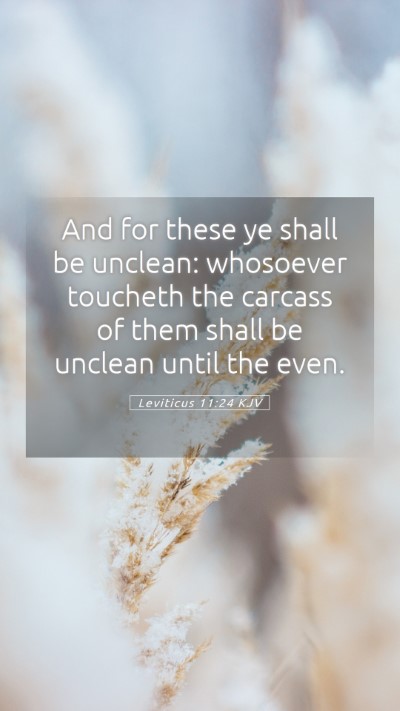Understanding Leviticus 11:24
Leviticus 11:24 states: "And by these you shall become unclean; whoever touches the carcass of any of them shall be unclean until the evening." This verse is part of the dietary laws given to the Israelites, detailing various animal classifications and their respective cleanliness or uncleanliness.
Bible Verse Interpretations
This verse serves to highlight the concept of ritual purity in Israelite society. It emphasizes the necessity of maintaining a state of cleanliness as prescribed by God. The regulations regarding what is considered “clean” or “unclean” play a substantial role in the religious practices and daily lives of the Israelites.
Commentary Insights
-
Matthew Henry:
Henry notes the strictness of God's laws concerning cleanliness and the impacts of touching a carcass, portraying it as a symbol of spiritual defilement. He emphasizes the importance of physical purity as a reflection of spiritual integrity.
-
Albert Barnes:
Barnes highlights the practical implications of these laws, showing how they foster a sense of holiness and distinction among the people. He interprets the concepts of clean and unclean as not merely physical states but also having spiritual significance, calling for vigilance and adherence to God’s commands.
-
Adam Clarke:
Clarke elaborates on the nature of the animals considered unclean and the rationale behind the cleanliness laws. His commentary discusses the health implications of these dietary restrictions while connecting them to divine commandment, emphasizing obedience to God in all aspects of life.
Meanings of Bible Verses
The essence of Leviticus 11:24 extends beyond dietary laws; it invites believers to consider the broader context of holiness in everyday living. By directing their actions according to God's rules, Israelites are reminded of their covenant with Him, where even mundane actions signify deeper commitments.
Application of Leviticus 11:24
For modern-day believers, this passage may be applied by encouraging a lifestyle that seeks to honor God's commands, assessing what they consume—both physically and spiritually. This principle advocates for discernment in choices that reflect reverence for divine standards.
Additional Cross References
- Numbers 19:11-22 - Discusses dealing with corpses and the associated uncleanness.
- Deuteronomy 14:3-21 - Further expands on clean and unclean animals and dietary laws.
- 1 Peter 1:16 - “Be holy, for I am holy”, emphasizing the call to holiness.
Bible Study Insights
This verse can serve as a rich topic for bible study groups and online bible study sessions, focusing on the implications of purity laws and their relevance today. Utilizing bible study tools such as commentaries and study guides can deepen the understanding of these passages.
Historical Context of Bible Verses
To fully grasp the historical context of Leviticus 11:24, one must consider the cultural practices of the Israelites. The notion of cleanliness held vast significance in ancient Israel, affecting not just individual worship, but communal identity and relationship with God.
In-Depth Bible Verse Analysis
The connotation of ‘uncleanness’ in Leviticus is multifaceted, indicating not only physical states but spiritual positions. Understanding this can help decipher similar themes found in both the Old and New Testaments regarding holiness, blasphemy, and redemption.
Conclusion
In summary, Leviticus 11:24 offers both a directive and a profound insight into living out faith through actions. The regulation of cleanliness underscores a greater spiritual truth: that how one lives in accordance with God’s laws directly affects their relationship with Him. Explorations into this passage pave the way for deeper biblical exegesis and scripture analysis.


